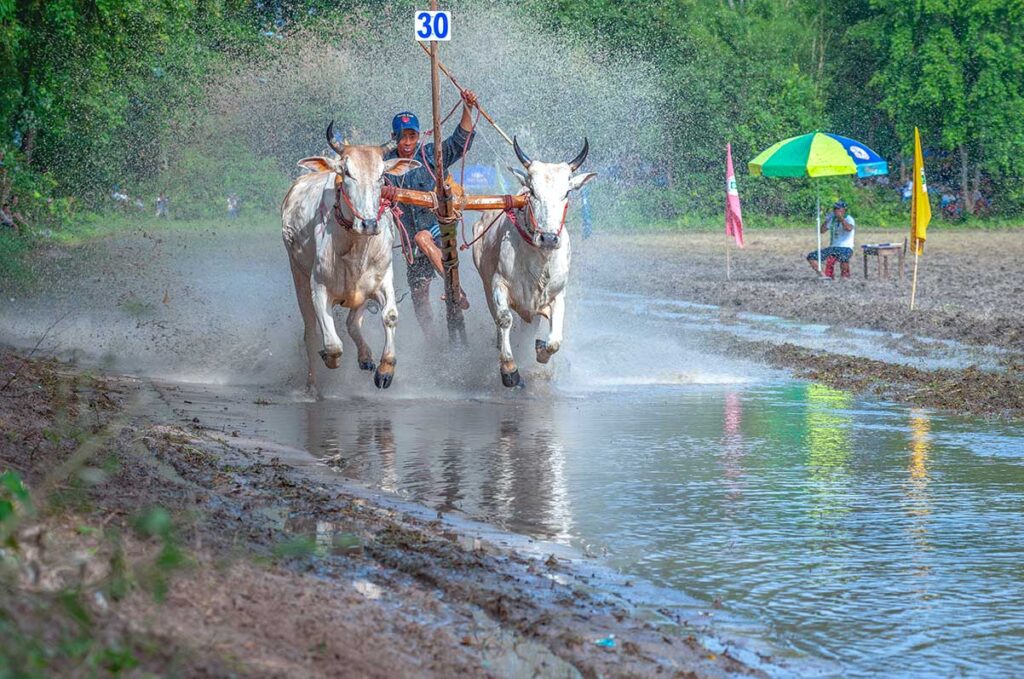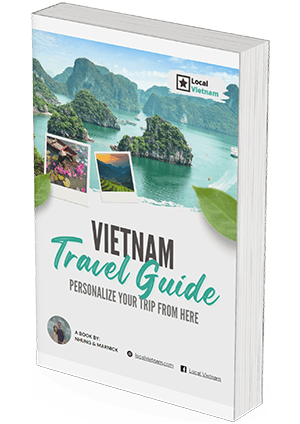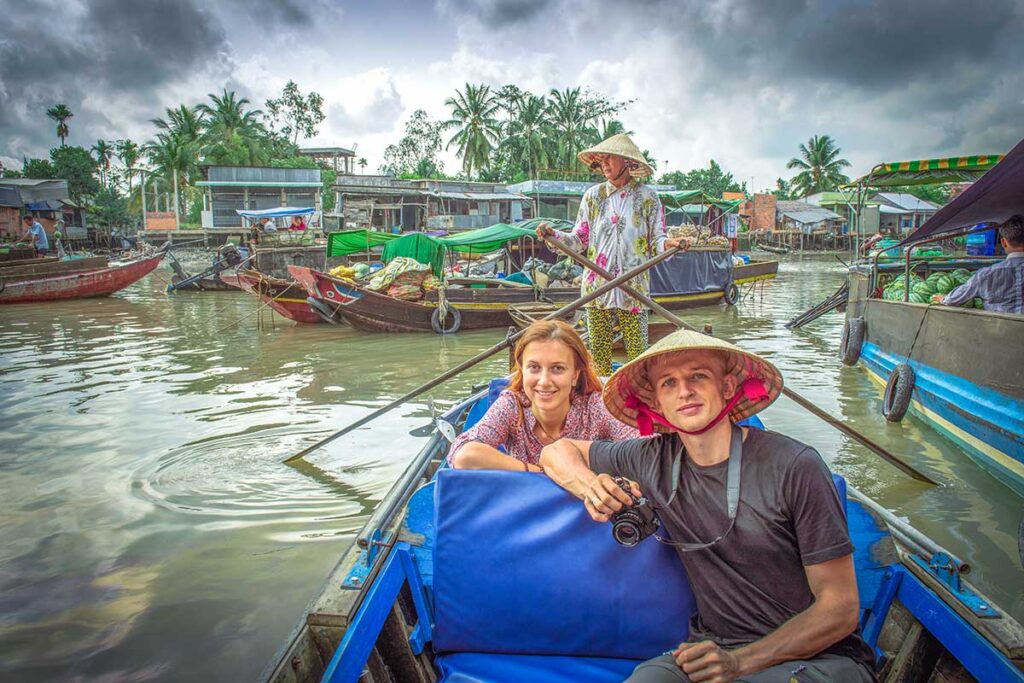What is the Bay Nui Ox Racing Festival?
Big-picture overview
The Bay Nui Ox Racing Festival is a cultural and sporting event of the Khmer people in An Giang Province’s Bảy Núi, or Seven Mountains, region. It takes place during the Sene Dolta season, when families honor their ancestors after the harvest. Over the years, what began as small-scale village races has grown into a province-wide highlight, officially recognized as a form of national intangible cultural heritage.
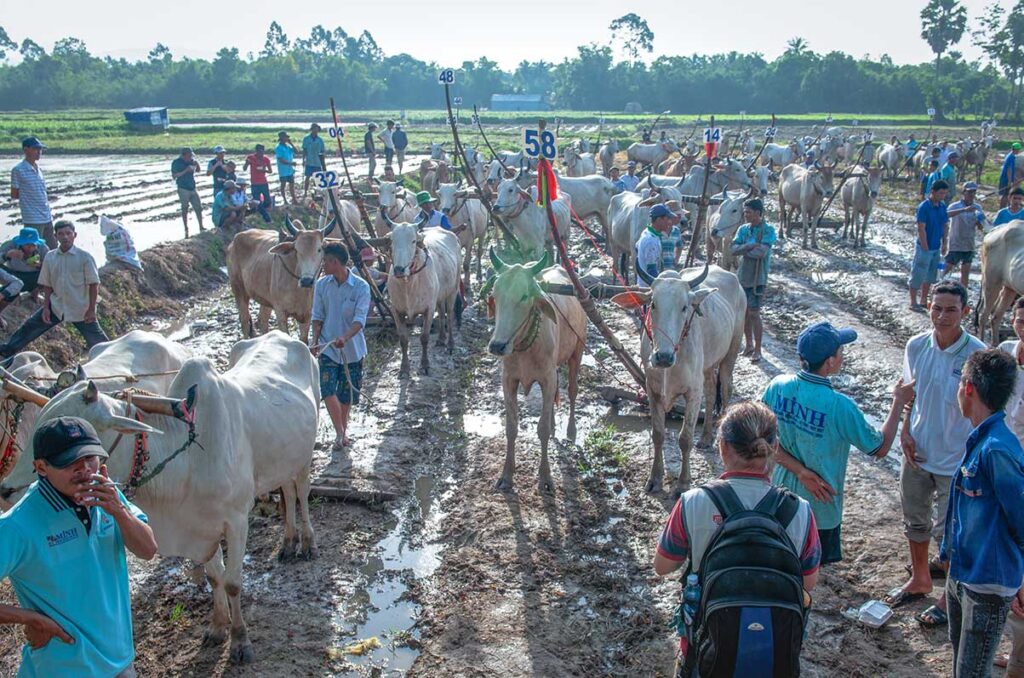
Where it sits in Khmer traditions
For the Khmer community, Sene Dolta is one of the three most important annual festivals, alongside Chol Chnam Thmay (New Year) and Ooc Om Bok (Moon Festival). It is a time of remembrance, when offerings are made at pagodas and families come together to pray for peace and prosperity. Within this setting, the ox races add a lively, communal spirit that balances the solemn ancestor rituals.
What actually happens (high level)
At the core of the festival are dramatic races across muddy paddy fields. Pairs of oxen are harnessed to a wooden board, while a jockey balances on top and guides them at full speed. The competition follows a knockout format, with winning teams advancing through rounds until the final, creating both suspense and excitement for the crowd.
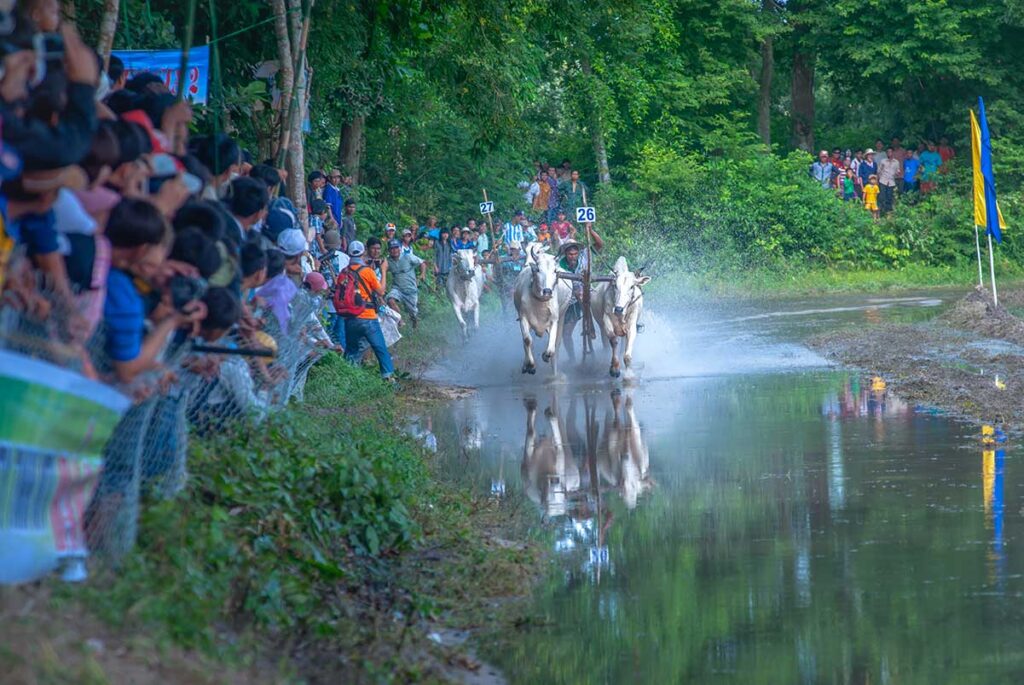
Why Bay Nui / community meaning
For locals, the races are more than entertainment. They are a chance for villages to showcase their strongest oxen, their skilled jockeys, and their community pride. Victory brings prestige, but the festival as a whole strengthens ties among Khmer villages and preserves a tradition that continues to define the identity of the Bay Nui region.
When is the Ox Racing Festival?
Dates in plain English
The Bay Nui Ox Racing Festival takes place during the Khmer Sene Dolta ancestor-honoring period, which usually falls in late August to late September on the solar calendar. The exact date shifts each year because it is based on the lunar calendar.
One day or multiple days?
The festival centers on one main race day, when the official competitions are held. Depending on the host location—either Tri Tôn or Tịnh Biên—there may also be opening ceremonies, warm-up races, or related community events in the days before.
How to confirm the exact date each year
Because the timing follows the lunar calendar, it’s essential to check the confirmed date each year. Local authorities in An Giang, along with Vietnamese news outlets, usually publish the schedule a few weeks in advance.
Where is the festival held?
Venue & host areas
The Bay Nui Ox Racing Festival takes place in An Giang Province’s Bay Nui region, with Tri Tôn district and Tịnh Biên township alternating as hosts. In recent years, the main venue has been the Ta Pa – Soài Chek Sports and Tourism Complex in Tri Tôn, which provides both the race field and facilities for spectators. Smaller editions are sometimes linked to pagodas such as Chùa Rô, but the large-scale competitions are usually organized at provincial-level racegrounds.
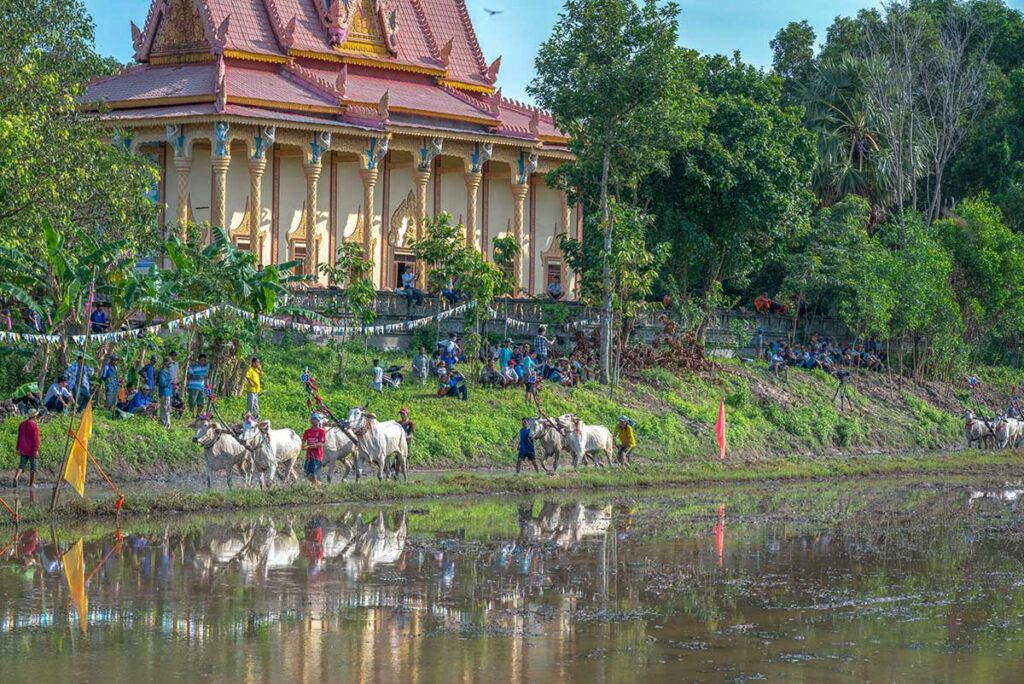
Why here
The Bay Nui area has long been the heart of Khmer life in An Giang, and its flat, water-logged rice fields are perfectly suited for ox racing. The track is usually about 200 meters long and 100 meters wide, plowed and flooded in advance to create the slick mud conditions required. This combination of cultural tradition and natural terrain makes the Bay Nui region the authentic home of the festival.
Highlights of the festival (what to look for)
1. Opening atmosphere & line-up
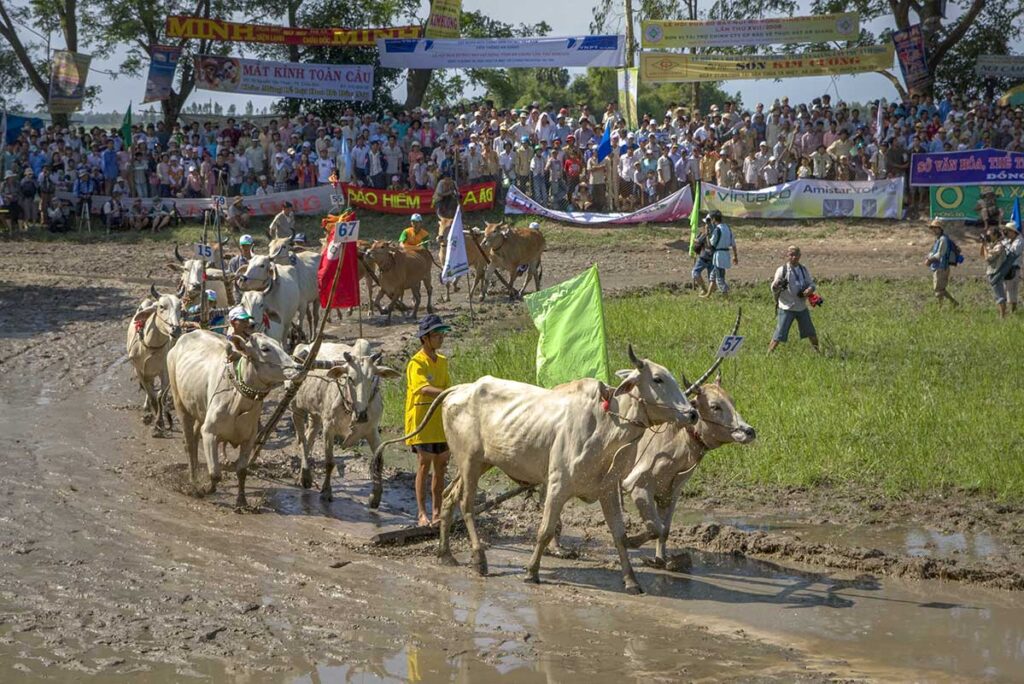
The day begins with a lively atmosphere as dozens of ox pairs from different communes across An Giang gather at the raceground. Crowds line the field early, waving flags, beating drums, and shouting encouragement. The build-up to the first race feels like a mix of sports event and community celebration.
2. The race format & “laps”
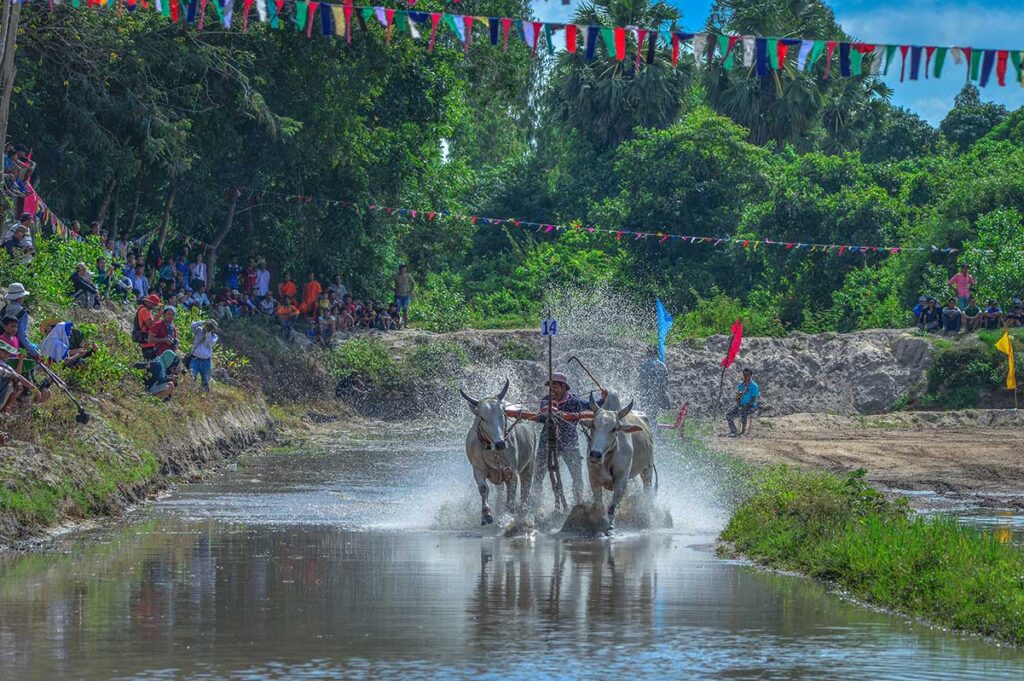
The competition is organized in knockout brackets, with pairs of oxen facing off heat by heat. Each match is fast and unpredictable—false starts or straying off track can mean immediate disqualification. The intensity rises as winning teams advance to the next round and the field narrows toward the final.
3. Track, flags & finish
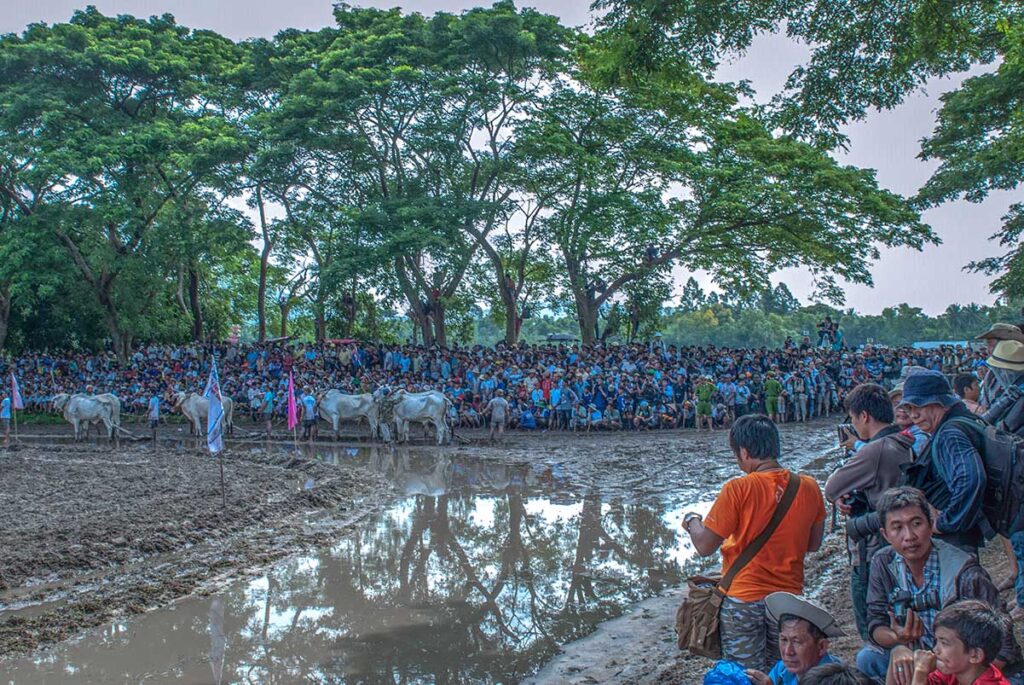
The track is a flooded paddy field lined with spectators. Colored flags mark the start and finish points, while the jockeys balance on wooden boards (harrows) dragged by their oxen. Victory is decided not only by speed but also by control—jockeys must stay upright, and the oxen must remain within the marked lane until the finish.
4. Sound & scene for creators
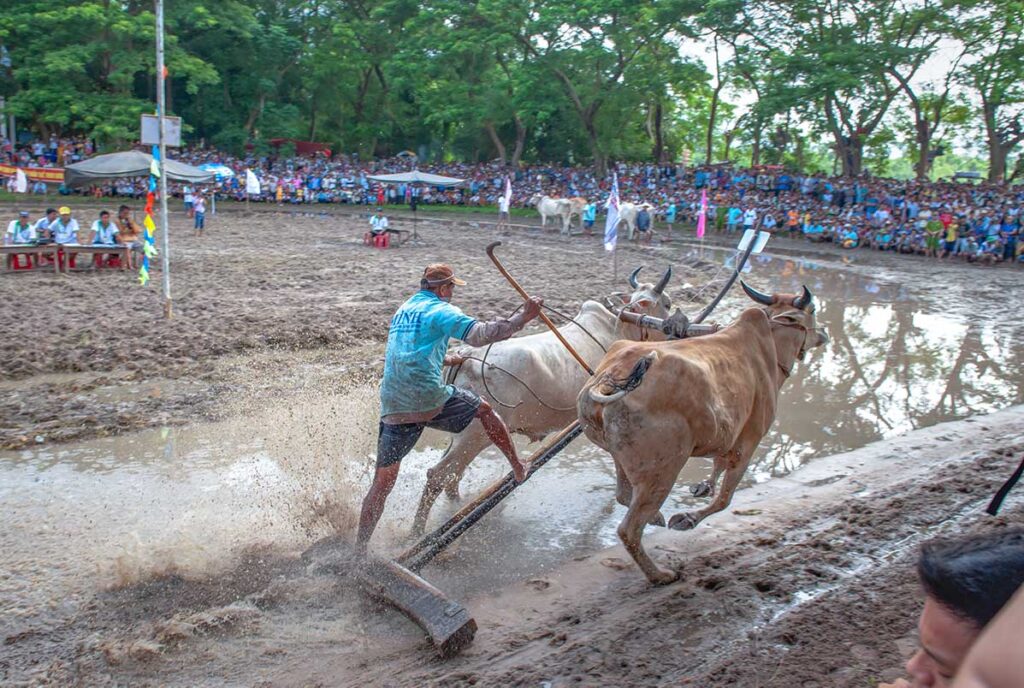
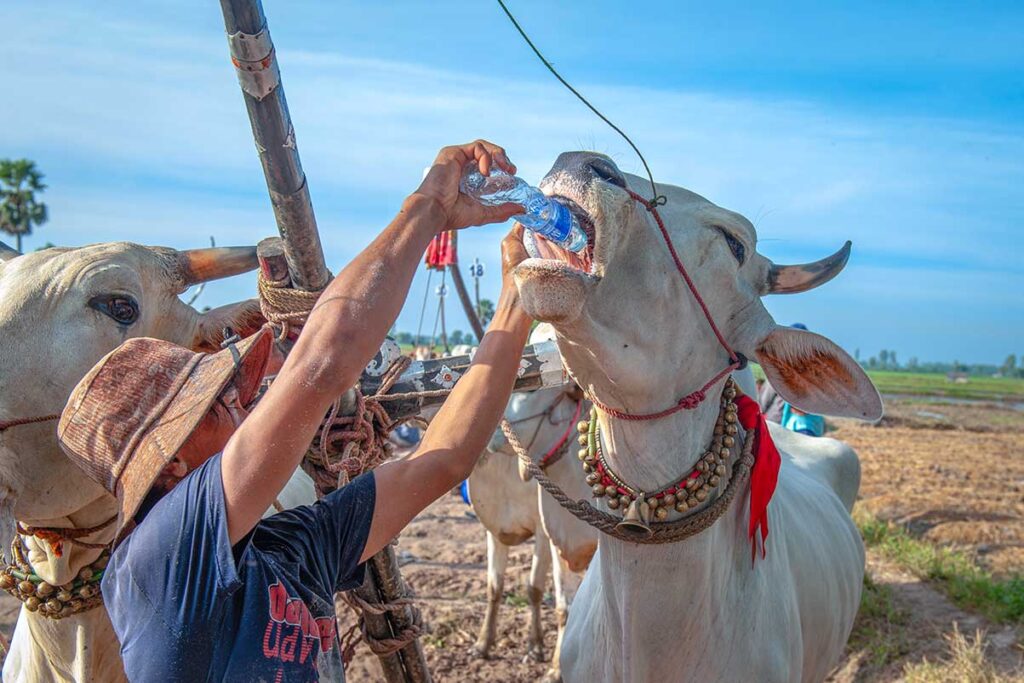
The race is a visual and sensory spectacle. Mud sprays high as oxen charge forward, drums and cheers echo around the field, and the close-range action makes every heat photogenic. For photographers and videographers, it’s a rare chance to capture both raw energy and vibrant community spirit.
5. Awards & closing
At the end of the day, the winners receive cups, flags, cash prizes, and honorary titles such as “Best Jockey”. Beyond the competition, the closing moments feel celebratory, with teams congratulated by cheering fans and the event often broadcast on local media, highlighting its cultural importance.
Getting there & planning a trip
Choosing a base
The most convenient base for travelers is Chau Doc, which offers a wide range of hotels, restaurants, and transport links, including routes onward to Cambodia. If you prefer to be closer to the race venue, Tri Tôn or Tịnh Biên are alternatives, though lodging and services there are much more limited.
Getting to Chau Doc
Most visitors reach the festival by first traveling to Chau Doc, the main town in An Giang Province. From Ho Chi Minh City, it’s about 6–7 hours by sleeper bus, limousine van, or private car. From Can Tho, the journey takes around 3–4 hours. Travelers coming from Ha Tien or Phu Quoc can connect via Ha Tien before heading inland to Chau Doc by bus or car.
Getting to the venue on race day
From Châu Đốc, expect a drive of about 35–45 kilometers (roughly one hour) to reach the raceground. The best option is to arrange a private car or an early taxi. Roads near the venue get busy, so plan to arrive well before the first heats if you want a good vantage point.
Tickets, access & crowd management
Entry to the festival is usually free, but the crowds can be dense. Most spectators stand along the edges of the muddy track, so expect little shade and limited seating. Parking areas are available nearby but fill up quickly.
What to bring (weather & comfort)
The festival takes place in the rainy season, so conditions can be hot, humid, and muddy. Bring sun protection, light rain gear, and shoes you don’t mind getting dirty. A bottle of water, some snacks, and a dry bag for valuables will make the day more comfortable.
Photography & filming tips
For photographers, a fast shutter speed and continuous autofocus are essential. Telephoto lenses capture close-up action, while wide angles show the scale and energy of the crowd. Be ready to protect your camera from splashing mud and rain.
Safety & etiquette
Respect the restricted zones around the track and avoid blocking the view of others. Drones are generally not permitted without special permission. Keep an eye on children if traveling as a family, as the embankments can be slippery and crowded.
Combine with nearby sights
If you’re already in the area, combine the race with trips to Tra Su Cajeput Forest, Nui Cam (Forbidden Mountain), Sam Mountain, or the Chau Doc floating village. These make for a more rounded visit.
Annual variance & confirmations
Because the dates follow the lunar calendar and the host district can change, it’s important to reconfirm the festival schedule each year through An Giang announcements or reliable local news.
Is the Bay Nui Ox Racing Festival worth visiting?
The Bay Nui Ox Racing Festival is a truly unique experience, but it’s not the kind of event most travelers plan an entire Vietnam trip around. If you are a photographer or a culture-focused traveler, it’s a dream to capture: mud flying, oxen charging, and crowds cheering in a setting you won’t find anywhere else in the country. For those already exploring the Mekong Delta or southern Vietnam, adjusting your itinerary to be in An Giang at the right time can be very rewarding.
That said, the festival also comes with trade-offs. It can be hot, muddy, and extremely crowded, with long travel times just to catch a few hours of racing. If you have a short itinerary or prefer more comfortable experiences, it may not be worth the detour. In the end, it’s best suited for travelers who value authentic, energetic local traditions and are curious to see something rare and visually spectacular.
